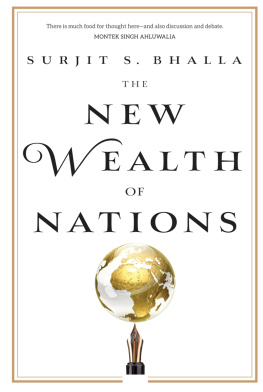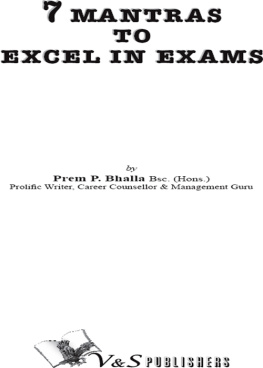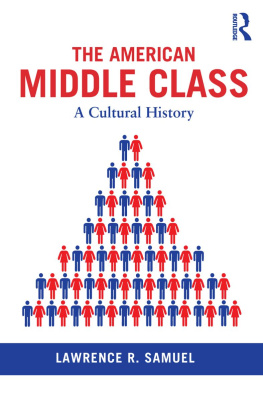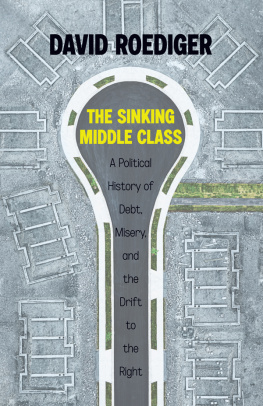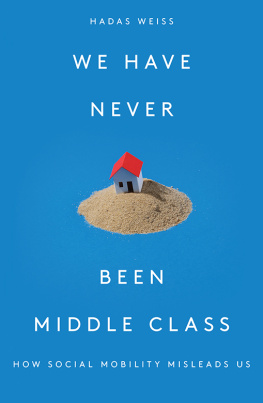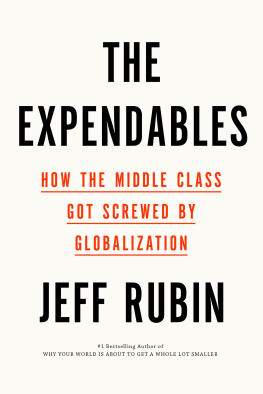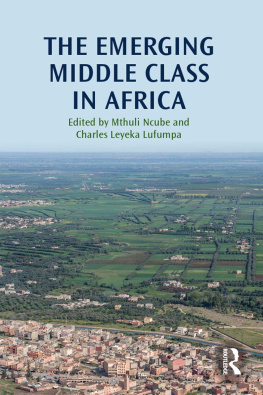
THE NEW WEALTH
OF NATIONS
Surjit S. Bhalla

For my parents and Ravinders
Thank you for emphasizing the need for an education
and for treating daughters and sons equally
The Times Are Changing
Come writers and critics
Who prophesize with your pen
And keep your eyes wide
The chance wont come again
And dont speak too soon
...
For the times they are a-changin
The Times They Are A-Changin by Bob Dylan
(music and lyrics by Bob Dylan, The Times They Are A-Changin, 1964)
T he 1960s should be remembered, will be remembered, and are remembered for the revolution they ushered in our thinking, in our music, and in our attitudes. World War II was over, and globalization was ascendant. Within two decades, the revolution gained pace. And it happened so fast. What happened, and why, is the story behind this book.
What happened? Recall that the Western world (including Japan) was fast recovering from the wars and depression of the previous thirty years. In these countries, per capita incomes expanded at a scorching 4.1 per cent per annum pace between 1951 and 1970. The welfare of the 700 million richest people was expanding, and expanding fast. The developing world (all countries outside of the West and the Soviet Union) housed 2.6 billion poor people in 1970 and their incomes had increased at a paltry 2.3 per cent per annum.
And then it happened. Starting around 1980, the transformation in the world, and in the lives of the poor, has been nothing short of radical, huge, and unprecedented. Over the last thirty-six years (19812016), the rich population has expanded its incomes at a 1.4 per cent rate; the poor world rate of expansion of income4.1 per cent per annum. The Industrial Revolution has been rightly considered transformative for the Western world; but any objective analysis must surely conclude that transforming the lives of more than 80 per cent of the worlds population, within merely thirty to forty years, is a much greater milestone. The intent here is not to compare but rather to illustrate. We must recognize and applaud that what we have just witnessed is the mother of all transformations.
In the iconic 1967 movie The Graduate, Benjamin (Dustin Hoffman) returns home from college and at a dinner party hosted in his honour gets pulled aside by Mr McGuire. Mr McGuire tells Benjamin, I just want to say one word to you, just one word.
Nervously, Benjamin says, Yes, sir.
Are you listening?
Yes, Sir.
Plastics. There is a great future in plastics. And so ended one of the most quotable 20 seconds in film history.
What has made this revolution possible? In a word, education. In two words, human capital. In a sentencethe catch-up of the East with the West in terms of schooling, and therefore earning skills, and therefore incomes, which has ultimately resulted in an improvement in world inequality. This process is nowhere near complete. In some countries like South Korea, Singapore, Hong Kong, and China, it can be rightly said that the process has reached a more advanced stage than in others like India, Bangladesh, and Pakistan. And as inexorable progress does take place, the world will have less poor, and become more equal. By 2030, world inequality will be the lowest it has been since the (relatively) halcyon days of the mid-19th century, i.e., the lowest ever.
I do not mean to argue or imply that human capital is the whole story. Critics have a tendency to latch on to broad statements and then say, But not so in Timbuktu. Of course, there are other important causal influencers of growth, of catch-up and of poverty reduction. The fortunes of the citizens of a nation are affected by the political environment and political leadership. For a long time it was believed that East Asian economies grew faster because they did not have democracies to shackle them. That wisdom was soon withdrawn when it was documented that most of the African and Latin American economies were growing very slowly owing to the fact that these two continents had the largest share of dictatorships. But strong leadership matters a great dealwitness communist China under Mao Zedong and authoritarian China under Deng Xiaoping (and his successors).
Explaining incomes: Education
Agreed that a Revolution is an emotive and extensive issue, and hence demands far more than just a uni-causal explanation, but some causes are more equal than others. And in this regard the cause of education towers over most of the competition. By far, the most profound effect on income is that of human capital. And to think that the queen (why the queen and not the king is explored in , i.e., a changing social order requires she to have an equal standing with he) of social sciences (economics) had missed this transformative cause until as late as the late 1950s! It was then that the genius of Gary Beckera Nobel laureate from the University of Chicagounleashed on to the world his all-encompassing treatise on family, fertility, and most importantly (not least for this book), how labour earnings would evolve in the future.
One other important aspect of global education is that it has not all been good news, especially for the losers. The losers are individuals in the West, and the loss is in terms of income growth. Economic growth in the developed world has slowed over the last couple of decades, and secular stagnation is how a leading US economist, Lawrence Summers, has described it. This stagnation means that there is now an ever-widening gap between the aspirations of the Western middle class and a now emerged reality. No longer is the future road paved with healthy growth.
For the last decade or so, the educated workforce in the West is caught, ironically, in a problem that plagued the illiterate East not so long ago. The educated workforce meets Sir Arthur Lewis, another Nobel laureate, and one of the economic geniuses of the 20th century. In an influential article written in 1954, Sir Arthur Lewis outlined why the wages of the unskilled, uneducated worker in the East (aka developing economies or emerging markets) would not rise, and would stay stuck at a constant, minimum, subsistence level.
Marry Sir Arthur with Gary Becker and what do you get? The misfortune of the college-educated Western skilled worker and the increasing fortune of the college-educated worker in the East. In a poignant and ironical twist, the reality today (and which explains much of the recent past and the next decade or two) is the reality of Unlimited Supply of Skilled Labour (sometimes referred to as USSL). It is this phenomenon that explains why labour incomes in the West have been reduced to a trickle from a trotand hence, why the educated Western worker feels the pain. Also, why world inequality has declined and will continue declining. Score one for global education.
There are several radical implications of this expansion in education and the transformation it is making possible. For centuries, make that since Adam and Eve, men have ruled the world. This dominance is changing, and is directly linked to the expansion of girls education. Just look at the following numbers; across the world, women constituted less than 25 per cent of the worlds population attending college in 1900; in 1980, this percentage was 41 per cent; in 2014, the fraction had risen to around 48.7 percent.
This is a clear indication of increasing equality, and men losing further ground in the future. Score two for global education.
Next page
